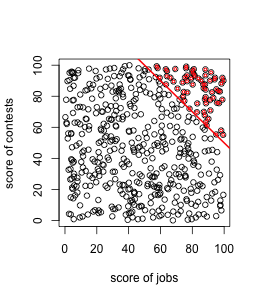Berkson's paradox
Berkson’s paradox describes a situation when two independent events become negatively correlated after one of them occurs. Here is an illustration.
A few weeks ago Peter Norvig said that “being a winner at one of these programming contests was actually a negative factor for performing well on the job”. As a possible explanation he mentioned that the winners are used to hacking a solution fast and moving to a next thing, which may not necessarily be good for the job.

Suppose a university is selecting candidates for a master programme. Performance at contests is evaluated from 0 to 100, and performance at jobs is also evaluated from 0 to 100. Students with a combined score of 150 or more are accepted, as illustrated. The correlation between the contest score and job score among those accepted would be about -0.48, meaning that if somebody among the accepted candidates is good in contests, it is likely that s/he was bad at jobs.
This happens because sample selection is biased in a way that candidates that are bad at both are eliminated. This does not mean that the selection procedure is flawed. This effect happens within the pool of selected candidates. It illustrates dangers of making conclusions from a biased sample.